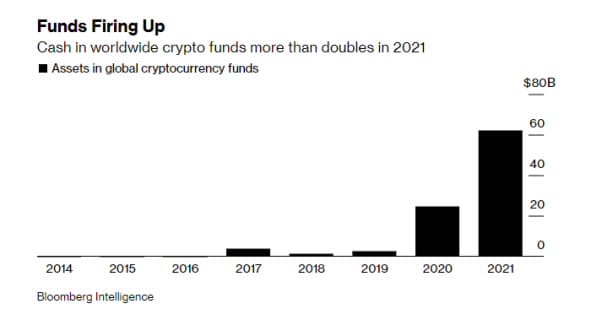Cryptocurrencies burst onto the global scene with the aim of disrupting the world of money and finance with their decentralisation pitch coming across as a breather from the centralised, tightly-knit world of high finance.
While for a long time, Wall Street remained skeptical about the promise of the change that crypto could bring about, it did not take time to look at crypto as yet another financial product that it could package and sell to interested buyers.
The latest on the scene are crypto exchange traded funds or ETFs. Here’s an explainer on what they are all about.
What are ETFs?
Exchange-Traded Funds (ETFs) bear a lot of resemblance to mutual funds. ETFs follow the movement of an underlying asset such as gold or an assortment of assets such as the NIFTY50. Borrowing from this concept, crypto ETFs are funds that track the movement of a single token or multiple crypto tokens.
Like any other stock, ETFs can be traded on exchanges through a brokerage service. This simplifies the process of portfolio diversification by providing investors easy access to an entire asset class. The buying and selling activity of investors results in price fluctuations, thus causing a movement in ETF prices daily.
As cryptocurrencies continue to rise in popularity, they are gradually taking up a larger share of global investments too. This comes at a time when concerns surrounding inflation continue to mount, with the USA battling its highest inflation levels in decades.
“Globally, it’s obviously a phenomenon that’s starting to take off,” Leah Wald, CEO of Valkyrie Investments, told Bloomberg in December 2021. Walk added that she had seen interest in crypto investment rise despite the volatility in bitcoin and other tokens.
What makes ETFs so important?
Last year, the big moment for crypto funds came when the Proshares Bitcoin ETF launched, taking only two days to garner investments worth $1 billion.
In 2021, crypto fund investments leapfrogged from $24 billion at the end of 2020 to $63 billion by the end of 2021 – a jump of 162%, according to Bloomberg.

How do crypto ETFs work?
Crypto ETFs attract investors as they work in a similar fashion as traditional asset-backed ETFs. As such, there are two kinds of crypto ETFs, each with its own working mechanism:
Physical-backed ETFs:
The prices of these ETFs are heavily dependent on actual crypto tokens, and therefore asset management companies must themselves also purchase the crypto tokens backing the ETF. The fund represents the value of each crypto token that it holds. Hence, if the value of the crypto tokens held by the company rises, the value of your investment also rises with it.
Futures-backed ETFs:
This ETF follows the price movements of crypto futures contracts. These are buy/sell agreements firmed such that the purchase price/selling price is predetermined for a fixed date in the future. This is irrespective of the price of crypto token prices on that date. These are safer investment options than physical-backed ETFs as one does not have to worry about managing the crypto tokens themselves.
Benefits of Crypto ETFs:
1. The convenience of investing is one of the greatest advantages of investing in a crypto ETF. The investor need not bother about handling the underlying asset, i.e., the crypto token.
2. Since crypto ETFs are traded on traditional exchanges, their buying and selling are well-regulated. This translates into better monitoring and protection against price manipulations by the governing authority – something that unregulated crypto exchanges cannot offer. While crypto wallets and exchanges are vulnerable to cyberattacks and hacks, ETFs make investors impervious to such risks.
3. Volume-investing in cryptocurrencies can drain investors of funds whilst also engaging them in the tedious process of opening accounts with multiple exchanges and maintaining numerous crypto wallets. Crypto ETFs offer indirect exposure to cryptocurrencies through a single investment vehicle.
Cons of Crypto ETFs:
1. There are limited options currently available in the ETF space for investing. Traditional ETFs cover a wider range of underlying securities as opposed to crypto ETFs that cover only a few cryptocurrencies.
2. As cryptocurrency price movements experience high volatility, they transmit the same effect to the crypto ETFs too. Thus, the repercussions.
3. As crypto ETFs are also traded on centralised exchanges, investors cannot exactly reap any benefits of decentralisation on the crypto blockchains.
Crypto ETFs that are available globally:
1. Amplify Transformational Data Sharing ETF
2. Bitwise 10 Crypto Index Fund
3. Siren Nasdaq NexGen Economy ETF
4. First Trust Indxx Innovative Transaction & Process ETF
5. Bitwise Crypto Industry Innovators ETF
6. Global X Blockchain ETF
7. Global X Blockchain & Bitcoin Strategy ETF

